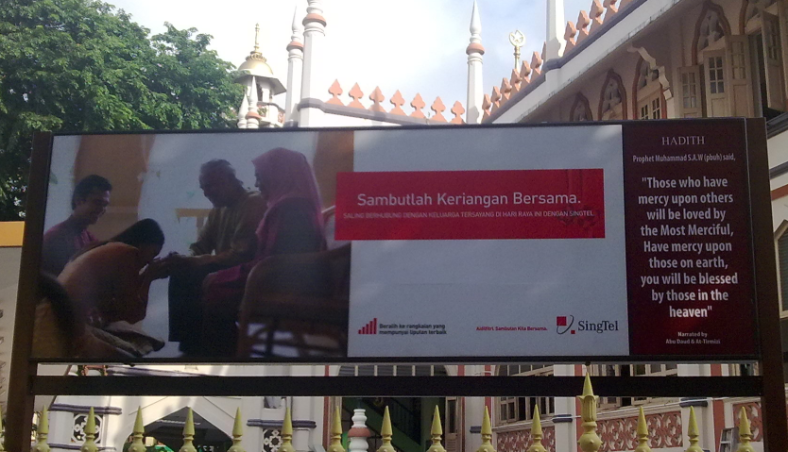 (Image credit)
(Image credit)
“Now I understand what you are saying! Before this I did not understand. I could go to hell for not understanding!” shouted the drunk from the middle of the prayer hall. He was oblivious to the stares and sniggers of the congregation. Perhaps most of them were agitated as they want to listen to the imam and make their way home. It was already past 10.00pm. But he doesn’t care. His attention was solely focused on the ustaz who was standing near the mihrab.
The night started out like any other night. I had decided to perform the nightly terawih in a large centrally-located mosque as I have heard of the guest imam’s ability in Quanic recitation. The prayer was led by a young and very qualified al-Azhar graduate, who is also a hafiz of the Quran.
Immediately after the witr prayers when the ustaz was about to share some of his thoughts in a short lecture to the congregation, the man had stood up, walked up to the ustaz, and whispered something to him. There were nods, a short conversation, and the man returned to his spot in the middle of the expansive prayer hall.
But almost as soon as the ustaz began his lecture, the tirades began. The man – who looked well-groomed and in his thirties – kept on questioning the ustaz, repeatedly asking whether he’ll go to hell if he does his prayers but doesn’t understand its meanings. The ustaz tried to answer his question but was always interrupted by the very questioner.
The poor man. I’m sure he hasn’t heard of the hadith where a man was granted paradise for giving water to a thirsty dog (see Musnad Ahmad ibn Hanbal). Or the man who was had his sins forgiven when he removed branches from a path (ibid.). Or the woman punished in hell for not feeding her cat (ibid., al-Bukhari and Muslim). All which shows that displaying compassion may be the tipping point in obtaining Allah’s grace. Not brushing off the importance of understanding Allah’s word, his query may also be answered simply with a copy of a Quran translation.
I contemplated on taking up the spot next to him to personally answer his question, but decided against it fearing that the wrong choice of words would spark off unexpected reactions and cause more disruptions in the mosque.
So the lecture went on, amidst the increasingly frequent interruptions and waning patience. What was initially thought as amusing is gradually being seen as an irritation. Even as constant haranguing was being directed at him, the ustaz pressed on with his mission, and broke into sporadic smiles to play down the congregation’s anxiety. Undeniably, tension was in the air. Some members of the congregation were getting impatient. Some tried to approach the man, waiting for a nod or some gesture from the ustaz to approve his removal from the sacred prayer hall.
But the ustaz would have none of that. Though at a young age, the ustaz must have realized how easy it is for men to twitch from composure to tremor. He carried on with his lecture, occasionally waving his hands to men approaching the drunk, signaling them to leave him alone. Then another man approached, this time sitting beside the drunk, attempting to reason with him.
You can’t reason with a drunk man.
The nafs took over quickly. The ustaz was right to instruct the men to keep their distance. Because in the blink of an eye, the sanctity of the mosque was shattered by the sight of two grown men wrestling on the ground. Others quickly swarmed in. Then the men were standing again, and the drunk was flung hard to the floor. In the fracas, the crowd forcefully lifted the drunk and separated the two agitated souls. People were shouting. Mercy was lost inside the very prayer hall where Muslims ask for Allah’s mercy, in the very month where mercy is supposed to be embodied.
The ustaz then proceeded to quickly complete his lecture.
Afterwards he went out and met some of the mosque stewards. Some were commending him for keeping his calmness, but did not see that he was leading by example. He voiced his disagreement over the way the matter was handled. The way the man was handled. He reminded them of the Prophet’s ﷺ time when a man came to the mosque and started to urinate. In the hadith, the companions were about to stop him when the Prophet ﷺ said:
لَا تُزْرِمُوهُ، دَعُوهُ
“Do not interrupt him, leave him.” When he was done, the Prophet ﷺ called him and said,
إِنَّ هَذِهِ الْمَسَاجِدَ ، لَا تَصْلُحُ لِشَيْءٍ مِنْ هَذَا الْبَوْلِ ، وَلَا الْقَذَرِ ، إِنَّمَا هِيَ لِذِكْرِ اللَّهِ عَزَّ وَجَلَّ ، وَالصَّلَاةِ ، وَقِرَاءَةِ الْقُرْآنِ
“These mosques are not meant for such things as urine and filthiness. Rather they are meant for making remembrance of Allah, and prayers, and for reading the Quran.” (see Muslim)
Maybe it was too long ago for Muslims today to remember our Prophet’s ﷺ teachings. Maybe it is nafs that failed to be tamed this Ramadan. Lest we forget, verily in you, my Liege ﷺ, is the best example.
؏
